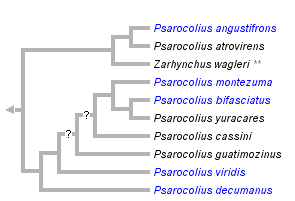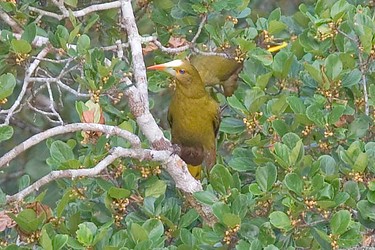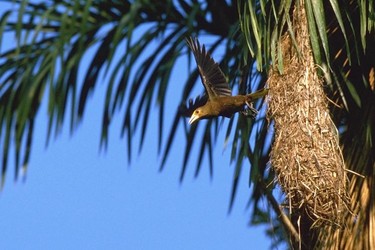Psarocolius
Scott Lanyon


This tree diagram shows the relationships between several groups of organisms.
The root of the current tree connects the organisms featured in this tree to their containing group and the rest of the Tree of Life. The basal branching point in the tree represents the ancestor of the other groups in the tree. This ancestor diversified over time into several descendent subgroups, which are represented as internal nodes and terminal taxa to the right.

You can click on the root to travel down the Tree of Life all the way to the root of all Life, and you can click on the names of descendent subgroups to travel up the Tree of Life all the way to individual species.
For more information on ToL tree formatting, please see Interpreting the Tree or Classification. To learn more about phylogenetic trees, please visit our Phylogenetic Biology pages.
close boxTree from Price and Lanyon (2004a,b). **Nomenclature for Zarhynchus wagleri will need to be changed if this phylogenetic position is confirmed by research that is currently being performed.
This clade is the subject of an NSF funded "Assembling the Tree of Life" grant (DEB-0316092) to Keith Barker (University of Minnesota), Kevin Burns (San Diego State University), John Klicka (University of Nevada-Las Vegas), Scott Lanyon (University of Minnesota), and Irby Lovette (Cornell University). Our goal is to sequence multiple genes for every species of "nine-primaried oscine" and to construct a robust phylogeny from these data. This page will be updated once this research has been completed.
References
Price, J.J. and S.M. Lanyon. 2004a. Patterns of song evolution and sexual selection in the oropendolas and caciques. Behavioral Ecology 15:485-497.
Price, J.J. and S.M. Lanyon. 2004b. Song and molecular data identify congruent but novel affiniteis of the Green Oropendola (Psarocolius viridis). Auk 121:224-229.
Title Illustrations

| Location | Brazil |
|---|---|
| Specimen Condition | Live Specimen |
| Identified By | Arthur Grosset |
| Source | Green Oropendola (Psarocolius viridis) |
| Copyright |
© 2006 Arthur Grosset

|
| Scientific Name | Psarocolius angustifrons |
|---|---|
| Location | Peru |
| Specimen Condition | Live Specimen |
| Identified By | Giuliano Gerra & Silvio Sommazzi |
| Copyright | © 2006 Giuliano Gerra & Silvio Sommazzi |
About This Page
Scott Lanyon

University of Minnesota, St. Paul, Minnesota, USA
Correspondence regarding this page should be directed to Scott Lanyon at
Page copyright © 2006 Scott Lanyon
 Page: Tree of Life
Psarocolius.
Authored by
Scott Lanyon.
The TEXT of this page is licensed under the
Creative Commons Attribution License - Version 3.0. Note that images and other media
featured on this page are each governed by their own license, and they may or may not be available
for reuse. Click on an image or a media link to access the media data window, which provides the
relevant licensing information. For the general terms and conditions of ToL material reuse and
redistribution, please see the Tree of Life Copyright
Policies.
Page: Tree of Life
Psarocolius.
Authored by
Scott Lanyon.
The TEXT of this page is licensed under the
Creative Commons Attribution License - Version 3.0. Note that images and other media
featured on this page are each governed by their own license, and they may or may not be available
for reuse. Click on an image or a media link to access the media data window, which provides the
relevant licensing information. For the general terms and conditions of ToL material reuse and
redistribution, please see the Tree of Life Copyright
Policies.
- First online 13 October 2006
- Content changed 13 October 2006
Citing this page:
Lanyon, Scott. 2006. Psarocolius. Version 13 October 2006 (temporary). http://tolweb.org/Psarocolius/67378/2006.10.13 in The Tree of Life Web Project, http://tolweb.org/









 Go to quick links
Go to quick search
Go to navigation for this section of the ToL site
Go to detailed links for the ToL site
Go to quick links
Go to quick search
Go to navigation for this section of the ToL site
Go to detailed links for the ToL site